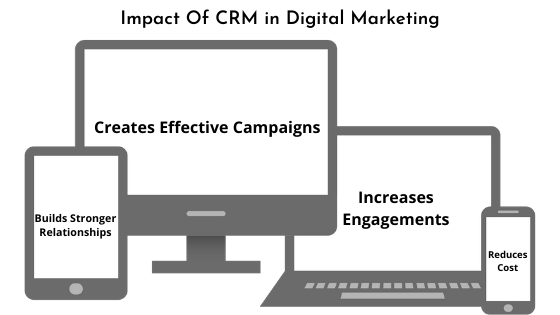“Maintaining and investing in a relationship has always been crucial and vital, be it personal or the professional world.”
Customer Relationship Management (CRM) has evolved a lot in the last few years. Initially, CRM was defined and designed to improve customer service. In today’s world, it relates to an entire business strategy.
The CRM software works as a single repository (a central location) for marketing. Identifying sales opportunities, and customer support services via CRM works as a streamline for people, policy, and processes on a single platform.

Operating a business has its challenges; for overcoming them, it requires a strategic approach. The role of Customer Relationship Management (CRM) comes in it.
CRM (Customer Relationship Management) consists of managing the company’s relationships and interactions with customers and potential customers, and suppliers in the most efficient possible way to extract more value.
The development of an effective marketing strategy is upon understanding and evaluating who you are serving, i.e. customers and what are their expectations from the brand.
How CRM Works?
The algorithm of the CRM system maintains and manages data from various sources such as email, the website of the company, live chats, and social media.
CRM is a database storing system. It stores data that is customer-centric such as purchasing history, preferences, needs, and financial demographics. From that database, businesses can easily create a blueprint of customer requirements.
Importance of CRM
The most valuable asset for any businesses is their customer’s trust. They don’t want to lose it easily, and retaining customer businesses invest a lot.
SRM is also one of those investments that successful companies have made for better performance. It is crucially essential for startups. As it becomes more challenging for them to understand the customer psyche in a dynamic environment without such instruments.

Today, most of the businesses are digital, which leads to more competition. The customer will choose the brand which is serving their needs in the most effective way. A customer will always seek a sense of belongingness with the business. And they always look for respect and personalized experience from the brands.
With CRM, most of the business ensures in establishing a long-term strategic relationship with its customers. They do it by keeping track of their needs, wants, and behaviour.
Eight essential building blocks of CRM:
- Vison.
- Strategy.
- Metrics.
- Collaboration.
- Customer Experience.
- Processes.
- Information.
- Technology.
Customer Relationship Management in Digital Marketing
Customer Relationship Management in Digital Marketing is the utilization of technologies and online communication channels. It helps in modifying and enhancing Customer Relationship and Experience Management initiatives.
The goal doesn’t only consist of an organization but acquainted with every customer’s habits and preferences. However, CRM also makes personalization easier.

E-commerce services are one of the many complete digitally influenced services in digital marketing. For example, when a customer looks or searches for something on Amazon. The CRMs would remember it. And therefore, recommend similar content or product on social media and SERP.
With the increase in online shopping continues the number of digitally influenced sales is likely to increase.
Impact of CRM in digital marketing

1. Reduces Cost:
Companies often search for methods to reduce the cost of digital marketing campaigns. CRM plays a vital role in the same. It is the only software that provides useful and needful data only.
Companies with the help of CRM channelize their workforce and resources towards the things that can bring success to the company and boost customer satisfaction.
CRM software is a highly cost-efficient software. It does all the calculations that are required to understand customer psychology. Its features do an in-depth analysis that is not possible for humans. Hence it saves both time and money.
2. Creates Effective Campaigns
With the information provided by CRM, improvement in the campaigns is quite easy. They can use it in digital marketing so that prospects interact through various platforms and target convertible leads.
Companies can have a better understanding of the data sourced by CRM. Like about what their customers think about them, and how new leads sees their company as.
The audience really likes it when brands or companies give a personal touch, the audience feels a sense of belongingness. And it eventually leads to brand loyalty.
3. Increases engagement
CRM provides the full blueprint of the target audience, companies get acquainted with the needs, wants, and behaviour which helps to plan, which is customized for the audience.
Individualized plans increase the number of engagements. User/Customer gets a personalized experience. Using CRM helps both parties to communicate and engage in the business
Eventually, the increase in engagements leads to increment in sales.
4. Builds Stronger Relationship
When a purchase is made, the company should put time and effort to ensure developing a relationship with the customer. It can help to increase the chances of upsells.
Customer service helps to build a relationship if a customer after a purchase has concern or issue with the product or the services, and they receive immediate customer support. Receiving good customer service will make a good impression on the customer about your service.
CRM can help customer representatives access all available information to solve the customer’s issue.
Conclusion
Customer Relation Management (CRM) is a software that is developed to have an in-depth analysis of consumer behaviour, needs, and wants. It can be used with digital marketing strategies too, to build a better relationship with the digital prospects, which eventually leads to customer loyalty and retention.
Apart from using CRM for digital marketing, check out how businesses can initiate content marketing strategies with digital marketing applications.





